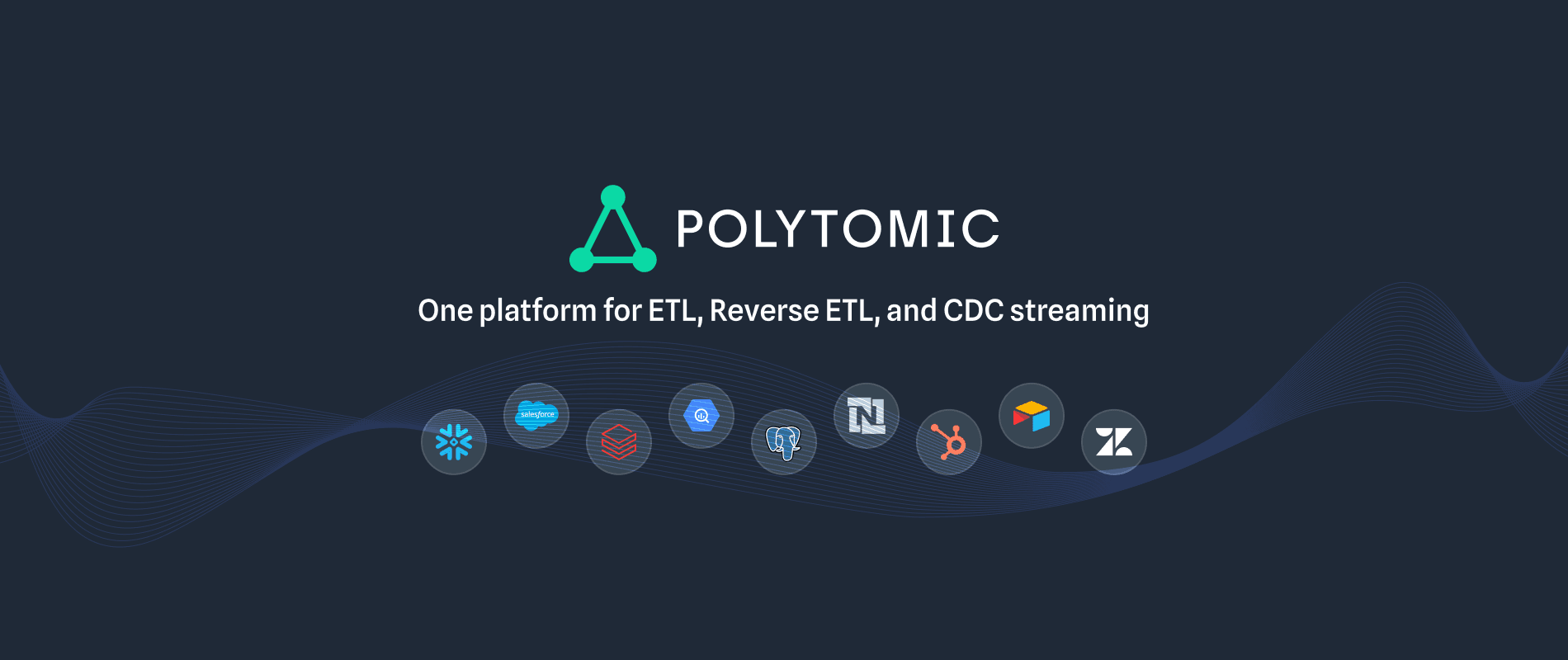Top 6 Dataddo Alternatives & Competitors
Dataddo is a no-code ETL platform that connects cloud services, business applications, data warehouses, and lakes, offering over 300 connectors and supporting real-time data synchronization for both technical and non-technical users.

What is Dataddo?

Dataddo
Dataddo is a no-code platform designed for data visualization and lightweight ETL.
Key Features
- Sync to and from data warehouses
- Ideal for small data scale
Limitations
- No bulk sync pricing for ETL
- Focused on visualization, not moving data
- Not reliable at meaningful scale
- Not designed for enterprise use
Pricing
Dataddo offers three primary pricing plans: Free, Data to Dashboards at $99 per month, and Data Anywhere, also priced at $99 per month. The Free plan allows for 3 data flows and up to 100,000 rows per month, with syncs occurring on a weekly basis. The paid plans provide more extensive features, including additional data flows, higher row limits, and more frequent sync intervals. For organizations with larger needs, the Enterprise plan offers tailored solutions to meet specific requirements.
Why Consider Dataddo Alternatives
While Dataddo offers a range of features, there are several reasons why companies might seek alternatives:
- No bulk sync pricing for ETL: Dataddo lacks a clear pricing structure for bulk data syncs, making it difficult for businesses to budget effectively.
- Limited features on platform and API: The platform and API offer fewer features compared to competitors, which can limit the flexibility and functionality needed for complex data operations.
- Less reliable at scale: Users have reported that Dataddo's performance can be inconsistent when handling large volumes of data, which can be a significant drawback for growing businesses.
- Not built for enterprise: Dataddo is not designed with enterprise-level needs in mind, lacking the robust features and support that large organizations require.
Below is a table breaking down six alternatives to Dataddo and their tradeoffs.
Feature-by-Feature Breakdown: Alternatives & Competitors
































































































Top 6 Dataddo Alternatives & Competitors
Polytomic
Data teams appreciate our single ETL platform with unified monitoring to centralize all data movement. We have full SQL support and first-class support for infrastructure-as-code.
RevOps and marketing teams use our no-code UI to quickly and independently set up syncs for product data to their CRM and ad platforms.
Built for enterprise scale, Polytomic can be self-hosted, handles billions of rows reliably, and has multi-tenant workspaces with fine-grained access controls.
















All the features you need, on the platform that does it all
Replace multiple vendors
Reduce costs and simplify workflows
One platform for all syncs
ETL, Reverse ETL, CDC, iPaaS, APIs, and spreadsheets
Sync only what's changed
Save on API limits and compute costs
Point and click
Select and filter your data without writing code
SQL query support
Powerful transformations when you need them
Pull from any API
No more glue code for custom integrations
Self-hosting available
Turnkey deployment to your private cloud
Enterprise-ready
SOC 2, GDPR, permissions, and audit logs
Integrated with your favorite tools
Sync any of your proprietary data from databases, data warehouses, and spreadsheets to the business systems you use.








Pricing begins at $500/month
Standard
Everything in Basic, plus:
- Sync to and from databases, warehouses, spreadsheets, apps, and APIs
- Unlimited users and connections
- Multiple sync destinations
- Live chat support with engineers
Enterprise
Everything in Standard, plus:
- On-prem deployment
- Single sign-on (SSO)
- Dedicated engineer
- Phone support

Fivetran
Fivetran is a widely-used ETL solution designed to transfer data from various sources such as SaaS applications, databases, and files into data warehouses including Snowflake, BigQuery, Databricks, and Redshift. It automates the data integration process, ensuring that data is consistently and accurately moved to the desired destination, enabling businesses to focus on analysis rather than data pipeline maintenance.

Key Features
- Widely-known ETL vendor
- Large number of built-in connectors
- Plug-and-play syncing into data warehouses
- Simple to use for smaller businesses
Limitations
- Unable to sync back into SaaS applications (no Reverse ETL)
- Frequent price increases
- High cost at medium scale and beyond
- Limited and unreliable customer support
- Slow response to new connector requests
Pricing
Fivetran provides several pricing tiers to accommodate different needs. Their Free Plan is available at no cost, while the Standard Plan is priced at $500 per million monthly active rows (MAR). For more extensive requirements, the Enterprise Plan costs $667 per million MAR, and the Business Critical Plan is set at $1,067 per million MAR. As of March 2025, Fivetran's bulk sync discounts are applied on a per connector basis rather than across the entire workspace, which has led to higher costs for many users.

Hightouch
Hightouch is a reverse ETL and AI platform tailored for marketing and personalization, empowering businesses to extract insights, execute campaigns, and develop AI-driven agents using their data. It features an AI Decisioning Platform for lifecycle marketing and a Composable Customer Data Platform (CDP) that is adaptable, secure, and rapidly deployable, all built on top of a data warehouse.

Key Features
- Sync data with Reverse ETL
- Emphasis on AI features and marketing personalization
- Free tier to get started
Limitations
- Does not support syncing to data warehouses (No ETL)
- Excess features and pricing for just Reverse ETL
- Lack of unlimited workspaces
Pricing
Hightouch provides a Starter Plan that includes a free tier at no cost and a paid tier priced at $350 per month, billed annually with a 20% discount. For larger organizations, the Business Plan offers custom pricing designed to meet specific requirements, featuring unlimited user seats and advanced personalization options.

Airbyte
Airbyte is a versatile open-source data integration platform aimed at centralizing data across warehouses, lakes, and databases. It provides various options such as Airbyte Cloud for rapid deployment, Airbyte Self-Managed Enterprise for robust data security, and Airbyte Open Source, trusted by more than 40,000 organizations. This flexibility makes it a go-to solution for diverse data integration needs.

Key Features
- Transfer data from various systems to data warehouses (ETL)
- Extensive range of built-in connectors
- Self-service capabilities
- Vibrant open-source community
Limitations
- Many connectors are only “community-supported”
- Complicated setup procedures
- Fragile and underdeveloped at scale
- Incapable of transferring data from warehouses to SaaS applications (No Reverse ETL)
Pricing
Airbyte provides several pricing tiers to cater to different needs. Their offerings include a free Open Source plan for those who prefer self-hosting, a Cloud plan that charges based on data volume, and Team and Enterprise plans that are capacity-based. Each plan differs in hosting options, sync frequency, and additional features. The Cloud plan may incur additional costs for more frequent syncs, while the Team and Enterprise plans come with various add-ons to enhance functionality.

Stitch Data
Stitch Data offers a cloud-based ETL solution that allows users to transfer data from more than 140 sources into a data warehouse with ease, requiring minimal technical know-how. In 2018, the company was acquired by Qlik, a legacy data provider, and subsequently integrated with Talend to enhance its data integration capabilities.

Key Features
- Move data from sources to data warehouse (ETL)
- No coding required
- SOC2 certified
Limitations
- Bugs and instability at scale
- Slow to update to connector API changes
- No Reverse ETL
- Lack of growth for new connector support
Pricing
Stitch Data provides three distinct pricing tiers to accommodate various user requirements and data capacities. The Standard Plan begins at $100 per month, offering essential features for smaller operations. For more advanced needs, the Advanced Plan is available at $1,250 per month when billed annually. This plan includes enhanced capabilities suitable for growing businesses.
At the top end, the Premium Plan costs $2,500 per month, also billed annually, and is tailored for enterprises with extensive data needs. Each plan scales its features to match the complexity and volume of data handled by the user.

Hevo Data
Hevo Data is a no-code platform designed for ETL processes, enabling users to seamlessly extract, transform, and load data from more than 150 different sources. This tool simplifies data integration, making it accessible for users without technical expertise to manage complex data workflows efficiently.

Key Features
- ETL data integration for syncing to data warehouses
- Works well at sub 5 million rows/month
- 150+ data sources
- Free tier available at small scale
Limitations
- Issues with scalability even at 5 million rows/month
- Slow support (even the Enterprise plan only offers 1hr support SLA)
- Unreliable for critical infrastructure
- No Reverse ETL offered
Pricing
Hevo Data’s pricing structure is well-suited for companies with modest data requirements. They provide a generous free tier that allows up to 1 million events to be synced each month. For those needing more, their starter plan ranges from $299 to $949 per month, accommodating between 5 and 50 million monthly synced events. Additionally, Hevo offers Professional and Business Critical plans that come with enhanced features for more demanding data needs.
Why customers are switching to Polytomic
Polytomic combines ETL, Reverse ETL, and CDC streaming in a single platform so you can move data to and from your data warehouse without managing multiple ETL tools.
- Loved by Data Teams: One single vendor for all ETL and Reverse ETL, covering high-scale CDC streaming, full SQL support, and Terraform integration.
- Easy for RevOps and Marketing: Point-and-click pipelines with power-user features like real-time SOQL transformations on Salesforce and native integrations with ad platforms.
- Integrations Powering AI Agents: White-label API with native clients for unified ETL; deep integrations with your customers’ GTM stack, finance tools, and data warehouses with fully managed authentication.
- Enterprise-ready: Self-hosting option, multi-tenant workspaces, fine-grained RBAC permissions, high scalability, and 30–50% cost savings from platform consolidation. Plus, support from engineers—in minutes, not days.
Get hands-on with Polytomic
See how easy it is to sync data to the tools your team actually uses—no code, no waiting.
